Fight Club Facts
- Thread starter Plainview
- Start date
You are using an out of date browser. It may not display this or other websites correctly.
You should upgrade or use an alternative browser.
You should upgrade or use an alternative browser.
This isn't a Fight Club fact exactly, but this article from CRACKED noted very strong correlations with another movie Cload & Dagger and imagines this movie as a prequel in a sort of fan-fiction way. It's an amusing read and makes Cloak & Dagger more disturbing or weird to look at this way.
The author of Fight Club liked this and re-Tweeted it.

The First Half Of Fight Club Was In A Movie You Never Saw
Answer this simple question, Fight Club fans: What's the name of Edward Norton's character?
Tyler Durden is, of course, the alter-ego he created. Is it Jack? That's the name in the script, but that hardly counts, considering it's never used on-screen in direct reference to Norton himself. Is he just the Narrator? That's not a name, that's a designation. But don't get discouraged -- he does have a name, and it's Davey Osborne. It just happens to come from Cloak & Dagger, a movie that functions uncannily well as a Fight Club prequel.
On the off-chance you haven't seen this obscure 1984 thriller, which was made in part to promote an Atari game that was never released, it stars 11-year-old Davey, a lonely kid whose mother just died. Davey doesn't take this well, obviously, and to make matters worse, his largely absent military father doesn't know how to connect with him. Hey, remember how Durden mentions that his father was distant and that they didn't really understand each other? And how neither Durden nor the Narrator mention a mother at all?
Anyway, Davey's only refuge from his crappy reality comes in the form of video games. He escapes into fantasy, and he lets that fantasy bleed into reality. In particular, he desperately needs a father figure. So he creates one.
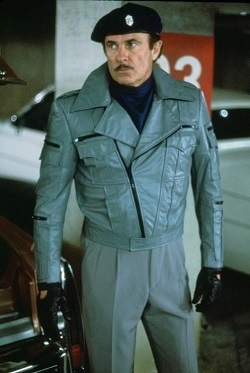
That's Jack Flack, the star of Davey's favorite video game, come to hallucinatory life. Jack talks to Davey, gives him advice, interacts with the environment, and generally seems real, but only Davey can see him -- just like the Narrator-Durden relationship in Fight Club. Jack is a full-blown dissociated alternate personality that looks just like his dad. And just like Durden, Jack is an amoral sociopath who doesn't seem too concerned for Davey's safety.
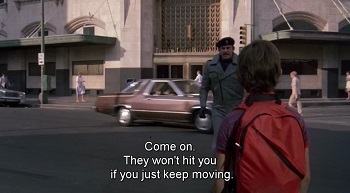
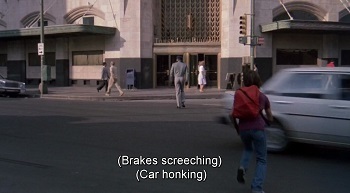
Long story short, Davey stumbles across a murder, and the dying man tasks him with getting a game cartridge loaded with military secrets to the FBI. This quickly entangles him with dangerous enemy spies. Now, Davey is a mild-mannered kid who's been thrust into a dangerous situation that he doesn't know how to handle. But Jack knows how to deal with the violence and intrigue, just like how Durden does all the dirty work that the Narrator's regular personality can't stomach in Fight Club. The threats, the bombs, the non-consensual violence -- whenever something nasty needs to be done, Durden steps in.
Now, Durden is first portrayed as eccentric, then as a full-blown lunatic. Jack is supposedly just tough and cavalier, and his advice helps Davey escape the evil spies several times. But let's walk through a key sequence in the movie, and you can judge for yourself whether he's "tough" or "balls-to-the-wall insane." Davey is being chased by two goons, and Jack, acting as the wise badass dreamed up by an 11-year-old that he is, counsels Davey to run between the two men, leading one to accidentally shoot his partner.
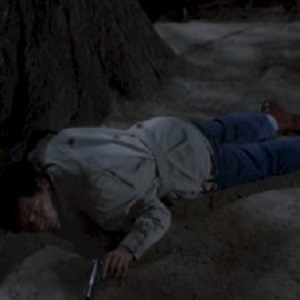
Jack then tells Davey to pick up the dead spy's gun. Because that's what a sad, lonely, meek kid would want, isn't it? Something that makes him feel incredibly powerful in a world where he has no power? Remember, that's what motivated Fight Club -- sad, lonely, meek men finding a way to feel power in a world where they're otherwise melancholy office workers. Jack even says "Good boy" when Davey picks the gun up. What fatherly approval! Then the second spy confronts a cornered Davey.
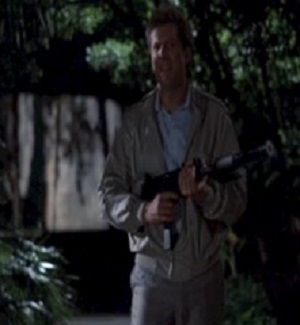
The bad guy tells Davey that he's going to shoot both his kneecaps, then shoot him in the stomach and watch him slowly die while ignoring his pleas for mercy, because villains were not subtle in the '80s.
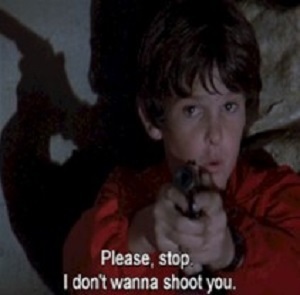
The panicked Davey tries to warn the man off, telling the spy that he doesn't want to shoot him. But Jack tells him to pull the trigger, and it isn't just practical advice in a grim situation; he's excited by the prospect. Davey protests, but part of him must want to shoot, because Jack is just another aspect of himself. It's the same situation in Fight Club. Durden is always the one pushing for the situation to escalate. He pushes for the first fight, he pushes for the club, he pushes for the pranks and acts of terror. The Narrator is always a little reluctant, but he also always goes along, because Durden is just an extension of the part of him that wants all the violence and chaos. And of course, because this movie doesn't end with the brutal murder of a child, Davey kills the spy. It's also the dying breath of Davey's sanity.
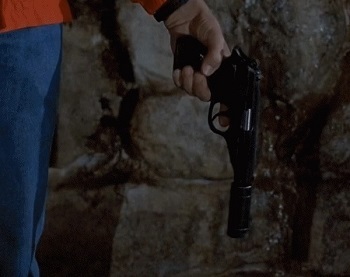
A horrified Davey throws away the gun, pulls out the Jack Flack action figure he's been carrying around with him, and breaks it in half in rebellion against his hallucination, shouting "I don't want to play anymore!" This makes Jack, who appears to be full of bullets, vanish from existence. Davey was happy to go along with Jack when their adventures were fun and exciting, but as soon as there are grim, real-world consequences, Davey rejects him as a dangerous fantasy. This happens again in Fight Club. Tyler Durden's friendship is liberating! Their fights and pranks on society make the Narrator feel alive! It's only when Bob gets killed and Durden plans to commit widespread terrorism that the Narrator rejects him and shoots himself to destroy the alternate personality he hadn't previously realized had such control over him. Hell, they even both go out the same way -- Jack asks for a smoke as he fades away, while Durden blows a smoke ring. Because to a child of the '80s, what's cooler than smoking?
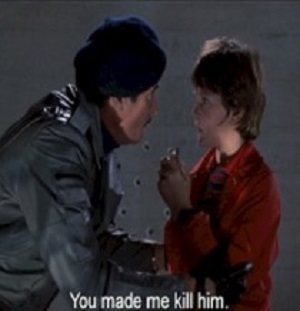
But Cloak & Dagger isn't over, and that's not how mental disorders work. A dissociative identity doesn't just vanish because you decide in a moment of stress and panic that you're all better now. It takes years of therapy; therapy that Davey will never get. Davey's alternate personality even gives him some "encouragement" as he fades away, and as you can expect from a fake person who just talked a child into shooting a dude, it's dark and cryptic.

Skip ahead to the climax and Davey, now fully invested in the espionage story he stumbled into, is chasing down two more spies who managed to both steal the crucial game cartridge from him and kidnap his only friend, Kim. Jack Flack's involvement escalated the situation to put Kim in danger, just like Durden escalated the Narrator's life to put his only real friend, Marla, in danger. And in the end, they both have to stop the actions of their more radical personalities. The spies' attempt to quietly escape on a commercial flight is foiled by Davey, who also brought a goddamn bomb with him to the airport, because movies made before 9/11 might as well be from the 1800s.
The spies don't realize that Davey has a bomb, so they take him hostage, storm onto an empty plane, and demand a pilot. Davey's dad, who by this point has been roped into the plot, volunteers. Meanwhile, a panicked Davey is trying to will Jack back into existence, because he needs his help. His real dad, in an attempt to calm his son, starts calling himself Jack, because he knows his son is a big fan of this fictional character.
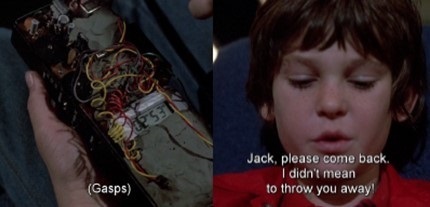
As the plane taxis down the runway, Davey's dad gets him off the plane, but can't escape himself before the bomb explodes, killing him and the spies. Except ...
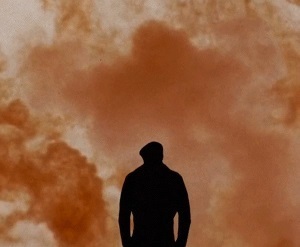
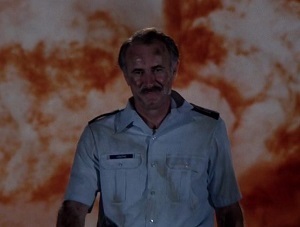
Yeah, bulls***. There is no way in hell that Davey's father survived that explosion. It's a solid, all-encompassing wall of fire. What really happens is that Davey refuses to believe that his father died horribly thanks to him, so he brings Jack Flack back to be his dad without realizing it. It's obviously Jack's silhouette that walks out of the flames, and "Dad" even says that "Jack Flack always escapes." This would not be the best time for a cute dad quip.
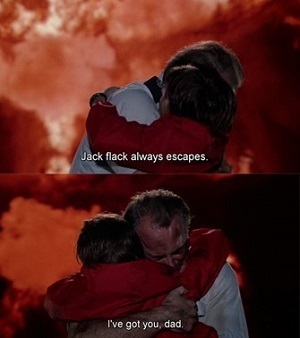
Jack never goes away -- he just gets buried within Davey's increasingly complicated mind. A mind where on one level he knows he's killed people, including his dad, and on another level has no idea that his dad is even dead. And so Davey grows up to be the Fight Club Narrator. Davey's father died on a plane, and the Narrator has an obsession with how easily an airplane can explode, and what that can do to your body.
Even when Davey's father was alive, he was absent, and the Narrator and Durden discuss life with absent, detached fathers.
He has a fascination with the way people can suddenly die, just like his mother did.
He can make bombs, because he's been using them since he was 11.
Hell, Jack Flack and Tyler Durden even have the same taste in jackets.
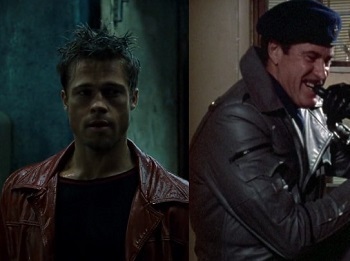
Perhaps most important is the narrator's obsession with anatomy. "I am Jack's colon; I am Jack's medulla oblongata." The Fight Club Narrator is quoting anatomy articles, but where did they come from? Did he write them himself as one of his split personalities? Davey saw his dad, who called himself Jack, explode. His large intestine probably wrapped its charred remains around some of the plane's melted controls, while his pancreas shot through the roof. But Jack survived as a hallucination. Wouldn't you want to know precisely how the human body worked if you're going to keep a fake one alive in your head? And wouldn't those articles make great training manuals for a fighter? Say, one who starts an entire underground club dedicated to fighting? Some sort of fighting enthusiasts group, if you will?
Tyler Durden is the new, refined and more potent version of Jack Flack, born from decades spent festering in Davey's subconscious while Davey's frustrations with the world built up. Davey's life didn't get better after he foiled those evil spies. Maybe he ended up in foster care, maybe he went to some distant relatives, but either way, whatever dreams he had died, and he slipped into an utterly average career and life. Somewhere along the way, the need for a father figure died, and Jack Flack morphed into Durden. All of Flack's skills got transferred to Durden, along with all of Davey's dark adult desires for violence and sex.
Part of the appeal of Fight Club is that the narrator is an everyman, an utterly average guy who's grown frustrated with the trappings of modern life. But everyone gets frustrated with modernity -- it takes a hell of a lot more than that to spawn a dissociated personality who systematically builds a nationwide terror group. And now you know where that extra layer of trauma, anger, depression, and general f***ed-up-ness came from: an '80s kid who went through way more s*** than any kid ever should. The Narrator had a name, and it was Davey Osborne.
The author of Fight Club liked this and re-Tweeted it.

The First Half Of Fight Club Was In A Movie You Never Saw
Answer this simple question, Fight Club fans: What's the name of Edward Norton's character?
Tyler Durden is, of course, the alter-ego he created. Is it Jack? That's the name in the script, but that hardly counts, considering it's never used on-screen in direct reference to Norton himself. Is he just the Narrator? That's not a name, that's a designation. But don't get discouraged -- he does have a name, and it's Davey Osborne. It just happens to come from Cloak & Dagger, a movie that functions uncannily well as a Fight Club prequel.
On the off-chance you haven't seen this obscure 1984 thriller, which was made in part to promote an Atari game that was never released, it stars 11-year-old Davey, a lonely kid whose mother just died. Davey doesn't take this well, obviously, and to make matters worse, his largely absent military father doesn't know how to connect with him. Hey, remember how Durden mentions that his father was distant and that they didn't really understand each other? And how neither Durden nor the Narrator mention a mother at all?
Anyway, Davey's only refuge from his crappy reality comes in the form of video games. He escapes into fantasy, and he lets that fantasy bleed into reality. In particular, he desperately needs a father figure. So he creates one.

That's Jack Flack, the star of Davey's favorite video game, come to hallucinatory life. Jack talks to Davey, gives him advice, interacts with the environment, and generally seems real, but only Davey can see him -- just like the Narrator-Durden relationship in Fight Club. Jack is a full-blown dissociated alternate personality that looks just like his dad. And just like Durden, Jack is an amoral sociopath who doesn't seem too concerned for Davey's safety.


Long story short, Davey stumbles across a murder, and the dying man tasks him with getting a game cartridge loaded with military secrets to the FBI. This quickly entangles him with dangerous enemy spies. Now, Davey is a mild-mannered kid who's been thrust into a dangerous situation that he doesn't know how to handle. But Jack knows how to deal with the violence and intrigue, just like how Durden does all the dirty work that the Narrator's regular personality can't stomach in Fight Club. The threats, the bombs, the non-consensual violence -- whenever something nasty needs to be done, Durden steps in.
Now, Durden is first portrayed as eccentric, then as a full-blown lunatic. Jack is supposedly just tough and cavalier, and his advice helps Davey escape the evil spies several times. But let's walk through a key sequence in the movie, and you can judge for yourself whether he's "tough" or "balls-to-the-wall insane." Davey is being chased by two goons, and Jack, acting as the wise badass dreamed up by an 11-year-old that he is, counsels Davey to run between the two men, leading one to accidentally shoot his partner.

Jack then tells Davey to pick up the dead spy's gun. Because that's what a sad, lonely, meek kid would want, isn't it? Something that makes him feel incredibly powerful in a world where he has no power? Remember, that's what motivated Fight Club -- sad, lonely, meek men finding a way to feel power in a world where they're otherwise melancholy office workers. Jack even says "Good boy" when Davey picks the gun up. What fatherly approval! Then the second spy confronts a cornered Davey.

The bad guy tells Davey that he's going to shoot both his kneecaps, then shoot him in the stomach and watch him slowly die while ignoring his pleas for mercy, because villains were not subtle in the '80s.

The panicked Davey tries to warn the man off, telling the spy that he doesn't want to shoot him. But Jack tells him to pull the trigger, and it isn't just practical advice in a grim situation; he's excited by the prospect. Davey protests, but part of him must want to shoot, because Jack is just another aspect of himself. It's the same situation in Fight Club. Durden is always the one pushing for the situation to escalate. He pushes for the first fight, he pushes for the club, he pushes for the pranks and acts of terror. The Narrator is always a little reluctant, but he also always goes along, because Durden is just an extension of the part of him that wants all the violence and chaos. And of course, because this movie doesn't end with the brutal murder of a child, Davey kills the spy. It's also the dying breath of Davey's sanity.

A horrified Davey throws away the gun, pulls out the Jack Flack action figure he's been carrying around with him, and breaks it in half in rebellion against his hallucination, shouting "I don't want to play anymore!" This makes Jack, who appears to be full of bullets, vanish from existence. Davey was happy to go along with Jack when their adventures were fun and exciting, but as soon as there are grim, real-world consequences, Davey rejects him as a dangerous fantasy. This happens again in Fight Club. Tyler Durden's friendship is liberating! Their fights and pranks on society make the Narrator feel alive! It's only when Bob gets killed and Durden plans to commit widespread terrorism that the Narrator rejects him and shoots himself to destroy the alternate personality he hadn't previously realized had such control over him. Hell, they even both go out the same way -- Jack asks for a smoke as he fades away, while Durden blows a smoke ring. Because to a child of the '80s, what's cooler than smoking?

But Cloak & Dagger isn't over, and that's not how mental disorders work. A dissociative identity doesn't just vanish because you decide in a moment of stress and panic that you're all better now. It takes years of therapy; therapy that Davey will never get. Davey's alternate personality even gives him some "encouragement" as he fades away, and as you can expect from a fake person who just talked a child into shooting a dude, it's dark and cryptic.

Just what every child with abandonment issues needs to hear!
Skip ahead to the climax and Davey, now fully invested in the espionage story he stumbled into, is chasing down two more spies who managed to both steal the crucial game cartridge from him and kidnap his only friend, Kim. Jack Flack's involvement escalated the situation to put Kim in danger, just like Durden escalated the Narrator's life to put his only real friend, Marla, in danger. And in the end, they both have to stop the actions of their more radical personalities. The spies' attempt to quietly escape on a commercial flight is foiled by Davey, who also brought a goddamn bomb with him to the airport, because movies made before 9/11 might as well be from the 1800s.
The spies don't realize that Davey has a bomb, so they take him hostage, storm onto an empty plane, and demand a pilot. Davey's dad, who by this point has been roped into the plot, volunteers. Meanwhile, a panicked Davey is trying to will Jack back into existence, because he needs his help. His real dad, in an attempt to calm his son, starts calling himself Jack, because he knows his son is a big fan of this fictional character.

As the plane taxis down the runway, Davey's dad gets him off the plane, but can't escape himself before the bomb explodes, killing him and the spies. Except ...


Yeah, bulls***. There is no way in hell that Davey's father survived that explosion. It's a solid, all-encompassing wall of fire. What really happens is that Davey refuses to believe that his father died horribly thanks to him, so he brings Jack Flack back to be his dad without realizing it. It's obviously Jack's silhouette that walks out of the flames, and "Dad" even says that "Jack Flack always escapes." This would not be the best time for a cute dad quip.

Jack never goes away -- he just gets buried within Davey's increasingly complicated mind. A mind where on one level he knows he's killed people, including his dad, and on another level has no idea that his dad is even dead. And so Davey grows up to be the Fight Club Narrator. Davey's father died on a plane, and the Narrator has an obsession with how easily an airplane can explode, and what that can do to your body.
Even when Davey's father was alive, he was absent, and the Narrator and Durden discuss life with absent, detached fathers.
He has a fascination with the way people can suddenly die, just like his mother did.
He can make bombs, because he's been using them since he was 11.
Hell, Jack Flack and Tyler Durden even have the same taste in jackets.

Perhaps most important is the narrator's obsession with anatomy. "I am Jack's colon; I am Jack's medulla oblongata." The Fight Club Narrator is quoting anatomy articles, but where did they come from? Did he write them himself as one of his split personalities? Davey saw his dad, who called himself Jack, explode. His large intestine probably wrapped its charred remains around some of the plane's melted controls, while his pancreas shot through the roof. But Jack survived as a hallucination. Wouldn't you want to know precisely how the human body worked if you're going to keep a fake one alive in your head? And wouldn't those articles make great training manuals for a fighter? Say, one who starts an entire underground club dedicated to fighting? Some sort of fighting enthusiasts group, if you will?
Tyler Durden is the new, refined and more potent version of Jack Flack, born from decades spent festering in Davey's subconscious while Davey's frustrations with the world built up. Davey's life didn't get better after he foiled those evil spies. Maybe he ended up in foster care, maybe he went to some distant relatives, but either way, whatever dreams he had died, and he slipped into an utterly average career and life. Somewhere along the way, the need for a father figure died, and Jack Flack morphed into Durden. All of Flack's skills got transferred to Durden, along with all of Davey's dark adult desires for violence and sex.
Part of the appeal of Fight Club is that the narrator is an everyman, an utterly average guy who's grown frustrated with the trappings of modern life. But everyone gets frustrated with modernity -- it takes a hell of a lot more than that to spawn a dissociated personality who systematically builds a nationwide terror group. And now you know where that extra layer of trauma, anger, depression, and general f***ed-up-ness came from: an '80s kid who went through way more s*** than any kid ever should. The Narrator had a name, and it was Davey Osborne.
It's been decades since I've seen Cloak and Dagger. I've completely forgot what it's about. I need to watch it again and then read the above.This isn't a Fight Club fact exactly, but this article from CRACKED noted very strong correlations with another movie Cload & Dagger and imagines this movie as a prequel in a sort of fan-fiction way. It's an amusing read and makes Cloak & Dagger more disturbing or weird to look at this way.
The author of Fight Club liked this and re-Tweeted it.

The First Half Of Fight Club Was In A Movie You Never Saw
Answer this simple question, Fight Club fans: What's the name of Edward Norton's character?
Tyler Durden is, of course, the alter-ego he created. Is it Jack? That's the name in the script, but that hardly counts, considering it's never used on-screen in direct reference to Norton himself. Is he just the Narrator? That's not a name, that's a designation. But don't get discouraged -- he does have a name, and it's Davey Osborne. It just happens to come from Cloak & Dagger, a movie that functions uncannily well as a Fight Club prequel.
On the off-chance you haven't seen this obscure 1984 thriller, which was made in part to promote an Atari game that was never released, it stars 11-year-old Davey, a lonely kid whose mother just died. Davey doesn't take this well, obviously, and to make matters worse, his largely absent military father doesn't know how to connect with him. Hey, remember how Durden mentions that his father was distant and that they didn't really understand each other? And how neither Durden nor the Narrator mention a mother at all?
Anyway, Davey's only refuge from his crappy reality comes in the form of video games. He escapes into fantasy, and he lets that fantasy bleed into reality. In particular, he desperately needs a father figure. So he creates one.

That's Jack Flack, the star of Davey's favorite video game, come to hallucinatory life. Jack talks to Davey, gives him advice, interacts with the environment, and generally seems real, but only Davey can see him -- just like the Narrator-Durden relationship in Fight Club. Jack is a full-blown dissociated alternate personality that looks just like his dad. And just like Durden, Jack is an amoral sociopath who doesn't seem too concerned for Davey's safety.


Long story short, Davey stumbles across a murder, and the dying man tasks him with getting a game cartridge loaded with military secrets to the FBI. This quickly entangles him with dangerous enemy spies. Now, Davey is a mild-mannered kid who's been thrust into a dangerous situation that he doesn't know how to handle. But Jack knows how to deal with the violence and intrigue, just like how Durden does all the dirty work that the Narrator's regular personality can't stomach in Fight Club. The threats, the bombs, the non-consensual violence -- whenever something nasty needs to be done, Durden steps in.
Now, Durden is first portrayed as eccentric, then as a full-blown lunatic. Jack is supposedly just tough and cavalier, and his advice helps Davey escape the evil spies several times. But let's walk through a key sequence in the movie, and you can judge for yourself whether he's "tough" or "balls-to-the-wall insane." Davey is being chased by two goons, and Jack, acting as the wise badass dreamed up by an 11-year-old that he is, counsels Davey to run between the two men, leading one to accidentally shoot his partner.

Jack then tells Davey to pick up the dead spy's gun. Because that's what a sad, lonely, meek kid would want, isn't it? Something that makes him feel incredibly powerful in a world where he has no power? Remember, that's what motivated Fight Club -- sad, lonely, meek men finding a way to feel power in a world where they're otherwise melancholy office workers. Jack even says "Good boy" when Davey picks the gun up. What fatherly approval! Then the second spy confronts a cornered Davey.

The bad guy tells Davey that he's going to shoot both his kneecaps, then shoot him in the stomach and watch him slowly die while ignoring his pleas for mercy, because villains were not subtle in the '80s.

The panicked Davey tries to warn the man off, telling the spy that he doesn't want to shoot him. But Jack tells him to pull the trigger, and it isn't just practical advice in a grim situation; he's excited by the prospect. Davey protests, but part of him must want to shoot, because Jack is just another aspect of himself. It's the same situation in Fight Club. Durden is always the one pushing for the situation to escalate. He pushes for the first fight, he pushes for the club, he pushes for the pranks and acts of terror. The Narrator is always a little reluctant, but he also always goes along, because Durden is just an extension of the part of him that wants all the violence and chaos. And of course, because this movie doesn't end with the brutal murder of a child, Davey kills the spy. It's also the dying breath of Davey's sanity.

A horrified Davey throws away the gun, pulls out the Jack Flack action figure he's been carrying around with him, and breaks it in half in rebellion against his hallucination, shouting "I don't want to play anymore!" This makes Jack, who appears to be full of bullets, vanish from existence. Davey was happy to go along with Jack when their adventures were fun and exciting, but as soon as there are grim, real-world consequences, Davey rejects him as a dangerous fantasy. This happens again in Fight Club. Tyler Durden's friendship is liberating! Their fights and pranks on society make the Narrator feel alive! It's only when Bob gets killed and Durden plans to commit widespread terrorism that the Narrator rejects him and shoots himself to destroy the alternate personality he hadn't previously realized had such control over him. Hell, they even both go out the same way -- Jack asks for a smoke as he fades away, while Durden blows a smoke ring. Because to a child of the '80s, what's cooler than smoking?

But Cloak & Dagger isn't over, and that's not how mental disorders work. A dissociative identity doesn't just vanish because you decide in a moment of stress and panic that you're all better now. It takes years of therapy; therapy that Davey will never get. Davey's alternate personality even gives him some "encouragement" as he fades away, and as you can expect from a fake person who just talked a child into shooting a dude, it's dark and cryptic.

Just what every child with abandonment issues needs to hear!
Skip ahead to the climax and Davey, now fully invested in the espionage story he stumbled into, is chasing down two more spies who managed to both steal the crucial game cartridge from him and kidnap his only friend, Kim. Jack Flack's involvement escalated the situation to put Kim in danger, just like Durden escalated the Narrator's life to put his only real friend, Marla, in danger. And in the end, they both have to stop the actions of their more radical personalities. The spies' attempt to quietly escape on a commercial flight is foiled by Davey, who also brought a goddamn bomb with him to the airport, because movies made before 9/11 might as well be from the 1800s.
The spies don't realize that Davey has a bomb, so they take him hostage, storm onto an empty plane, and demand a pilot. Davey's dad, who by this point has been roped into the plot, volunteers. Meanwhile, a panicked Davey is trying to will Jack back into existence, because he needs his help. His real dad, in an attempt to calm his son, starts calling himself Jack, because he knows his son is a big fan of this fictional character.

As the plane taxis down the runway, Davey's dad gets him off the plane, but can't escape himself before the bomb explodes, killing him and the spies. Except ...


Yeah, bulls***. There is no way in hell that Davey's father survived that explosion. It's a solid, all-encompassing wall of fire. What really happens is that Davey refuses to believe that his father died horribly thanks to him, so he brings Jack Flack back to be his dad without realizing it. It's obviously Jack's silhouette that walks out of the flames, and "Dad" even says that "Jack Flack always escapes." This would not be the best time for a cute dad quip.

Jack never goes away -- he just gets buried within Davey's increasingly complicated mind. A mind where on one level he knows he's killed people, including his dad, and on another level has no idea that his dad is even dead. And so Davey grows up to be the Fight Club Narrator. Davey's father died on a plane, and the Narrator has an obsession with how easily an airplane can explode, and what that can do to your body.
Even when Davey's father was alive, he was absent, and the Narrator and Durden discuss life with absent, detached fathers.
He has a fascination with the way people can suddenly die, just like his mother did.
He can make bombs, because he's been using them since he was 11.
Hell, Jack Flack and Tyler Durden even have the same taste in jackets.

Perhaps most important is the narrator's obsession with anatomy. "I am Jack's colon; I am Jack's medulla oblongata." The Fight Club Narrator is quoting anatomy articles, but where did they come from? Did he write them himself as one of his split personalities? Davey saw his dad, who called himself Jack, explode. His large intestine probably wrapped its charred remains around some of the plane's melted controls, while his pancreas shot through the roof. But Jack survived as a hallucination. Wouldn't you want to know precisely how the human body worked if you're going to keep a fake one alive in your head? And wouldn't those articles make great training manuals for a fighter? Say, one who starts an entire underground club dedicated to fighting? Some sort of fighting enthusiasts group, if you will?
Tyler Durden is the new, refined and more potent version of Jack Flack, born from decades spent festering in Davey's subconscious while Davey's frustrations with the world built up. Davey's life didn't get better after he foiled those evil spies. Maybe he ended up in foster care, maybe he went to some distant relatives, but either way, whatever dreams he had died, and he slipped into an utterly average career and life. Somewhere along the way, the need for a father figure died, and Jack Flack morphed into Durden. All of Flack's skills got transferred to Durden, along with all of Davey's dark adult desires for violence and sex.
Part of the appeal of Fight Club is that the narrator is an everyman, an utterly average guy who's grown frustrated with the trappings of modern life. But everyone gets frustrated with modernity -- it takes a hell of a lot more than that to spawn a dissociated personality who systematically builds a nationwide terror group. And now you know where that extra layer of trauma, anger, depression, and general f***ed-up-ness came from: an '80s kid who went through way more s*** than any kid ever should. The Narrator had a name, and it was Davey Osborne.
